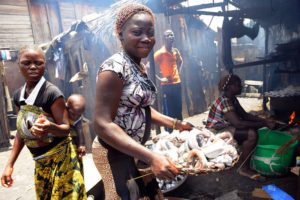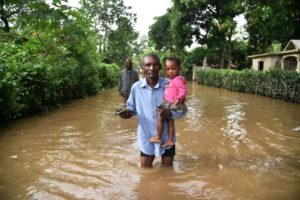
A girl carries smoked fish at Makoko shanty town in Lagos on August 30, 2012. Hundreds of residents of Makoko waterfront recently marched to government house to protest the demolition of their shanties while refuting allegations that the community harboured criminals. The high cost of living and the massive urbanization of Lagos, the largest city and the economic capital of Nigeria, has engineered a migration of residents mostly middle class and the poor to neighbouring towns in Ogun State, both in southwest part of the country in search of cheap accommodations. Estate developers are quick in exploiting the high cost and scarcity of accommodation leading to emerging new towns, modern estates to accommodate the spillover in Lagos. AFP PHOTO/PIUS UTOMI EKPEI (Photo credit should read PIUS UTOMI EKPEI/AFP/GettyImages)

A man walks in street that was flooded in Malfeti, in the city of Fort Liberte, in the city of Fort Liverte, in the north east of Haiti, on September 8, 2017, during the passage of Hurricane Irma.
Irma has been downgraded to a Category Four hurricane but is still extremely dangerous, the National Hurricane Center said. / AFP PHOTO / HECTOR RETAMAL (Photo credit should read HECTOR RETAMAL/AFP/Getty Images)
Angely dimaren
Eng110 316-A
11/5/2019
Global warming
My topic is Global warming, throughout time the average global temperature has increased at the fastest rate in recorded history. And experts see the trend is accelerating, all but one of the 16 hottest years in NASA’s 134 year record have occurred since 2000. Some may not know but the most vulnerable people affected by global warming are small islands, that is why I want to focus my map on Haiti and Nigeria. I believe we should be helping them out the most because they get exposed to the direct impacts of climate change the most. Recent studies like these shed new light on global warming, which previous studies had not addressed. People living in small islands are affected the most, Although every country in every continent is affected by global warming we should be investing in creating an emergency system to prevent these people from going into poverty.
According to the article “The Climate Crisis Is Global,but These 6 Places Face The Most Severe Consequences” by Tara Law Lagos, Nigeria is at extreme risk on maplecroft’s climate change vulnerability index. This is an issue because the population is increasing rapidly and its considered to be a major economic engine for the region. They also mention that climate change could threaten the city’s economy. The city is especially vulnerable because its located on the Gulf of Guinea, says levin. As sea levels rise, its likely to affect cause coastal erosion and contaminate potable water. This could harm local agriculture in the countryside and damage the country’s fishing industry, which could be dire in a country with tremendous poverty. Haiti is another place affected, the island nation is located in the “Atlantic Hurricane basin”, which means that it is vulnerable to hurricanes. In comparison to other projections on climate change, scientists are less certain about the link between climate change and hurricane frequency and intensity, but studies have suggested that hurricanes are likely getting wetter and more intense due to climate change.
Around the world people are experiencing both the subtle and stark effects of climate change. Gradually shifting weather patterns, rising sea levels and more extreme weather events are all clear and devastating. What causes global warming? This is how it works, it occurs when carbon dioxide and other air pollutants and greenhouse gases collect in the atmosphere and absorb sunlight and solar radiation that have bounced off the earth’s surface. normally , this radiation would escape into space but these pollutants, which can last for years to centuries in the atmosphere, trap the heat and cause the planet to get hotter thats whats known as the greenhouse effect. Basically they are saying that According to “ How climate change affects people living in poverty” climate change threatens the cleanliness of our air, depletes our water sources and limits food supply. It disrupts livelihoods, forces families from their homes and pushes people into poverty. During my research I came across another article called “how climate change is affecting our lives” I found out that yes we’ve known for decades about the damage all that extra heat is doing to the earth but humans keep doing things that affect the air we breathe, now a recent UN backed report on climate change highlights just how dangerous that process has been.
There are 3 ways that climate change is already affecting people’s lives, they are health, homes, and food. These are the 3 main things we need to survive, that’s why I believe we should be creating a system for places that are most affected by global warming. For health the problem is that the same dirty fossil fuel emissions that contribute to the greenhouse effect can lead to respiratory diseases such as asthma in children and adults. As far as homes for coastal communities, sea level rise could lead to an unwanted move. According to “ Here are three ways that climate change is already affecting peoples lives” as our globe warms, glaciers melt and ocean water expands, leading seas to rise about 7 to 8 inches on average since 1900 about 3 inches of that since 1993. The added volume of water creeping up coastlines slowly swallows land and homes and fuels more flooding inland. For food the probelm is that the same water accumalating in out atmosphere thanks to fossil fuels is actually changing the composition of fruits and vegetables that we eat, making them less nutritious. If we dont create some type of emergency system for these places, between 2030 and 2050, climate change is expected to kill an additional 250,000 people each year, from malnutrition, malaria,diarrhea and heat stress, while continuing to jeopardize clean air, safe drinking water and sufficient food supply.
In conclusion according to “ preparing communities for worsening disasters” natural disasters are growing more frequent and more severe, threatening the lives of the worlds most vulnerable people and the infrastructure they depend on. They have already started by investing in and initiating disaster mitigation tactics. In tajikistan, they reinforced river embankments to slow the effects of flooding. In indonesia, they are addressing the growing challenge of urban flooding, which climate change is making worse, by helping people identify when flooding might occur, developing early warning systems and establishing evacuation routes. We should also keep in mind that these warnings have to be taken serious some governors or presidents would see these types of warnings but wont take action just because they don’t want to spend all that time and money on evacuating and preparing these places because it might not be so serious but they don’t know that they should leave that up to people who know about the weather and when these disasters will occur.
hyperlinks:
https://time.com/5687470/cities-countries-most-affected-by-climate-change/
https://www.mercycorps.org/articles/climate-change-affects-poverty
https://www.climaterealityproject.org/blog/how-climate-change-affecting-our-lives



